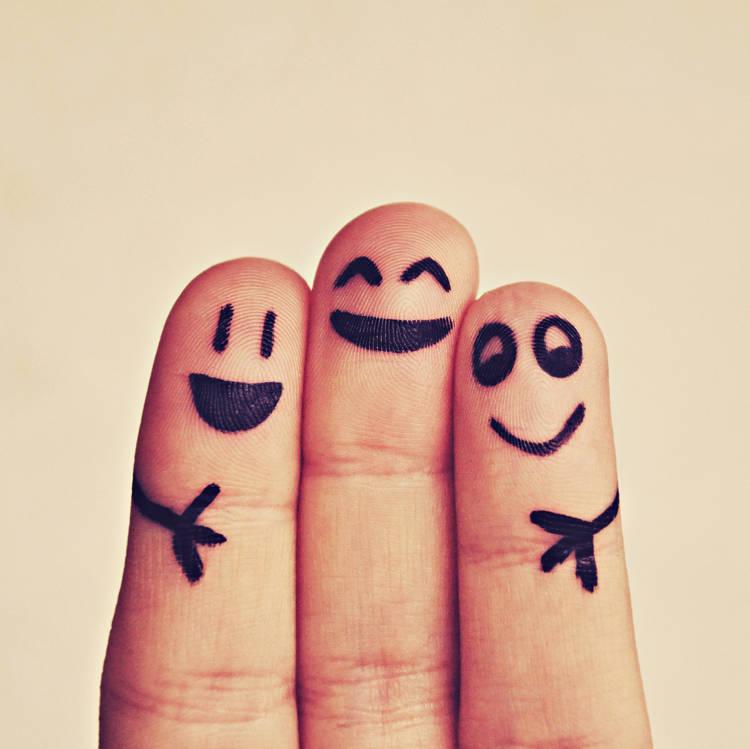You Don't Just Find Happiness, You Stumble Into It

You don’t just find happiness, you stumble into it. It’s simple. Daniel Gilbert makes this very clear in his bestseller Stumbling on Happiness, where he breaks down various findings, theories, and realities concerning happiness in a very entertaining way.
This book is a passionate journey through the way the mind works and plays with us. It covers a wide range of topics, from optical illusions to the influence of mood on opinions.
He also tells us that there’s no easy formula for finding happiness. However, the brain allows us to move towards the future and helps us understand what makes us stumble. What do you think makes you stumble? We invite you to continue reading and reflect on the subject.
Happiness is subjective
Sometimes we forget that happiness is subjective, especially when it’s being described by who want to sell it as if it were a limited, material good. Happiness is an experience, and as such, it’s different for every person and depends on the circumstances.
“…we can be certain that if we ask enough people the same question, the average answer will be a more or less appropriate indicator of the experience in question. The science of happiness requires that we play with probability, and the information that science provides always runs the risk of being incorrect.”

When we imagine the situations we might go through in the future, we realize that there are clearly two types of future. The immediate future, which will come tomorrow or in a few days, which feels closer and more certain. And the distant future, which feels light years away, fuzzy, and intangible.
“…people imagine a near-future pain as so severe that they will gladly pay a dollar to avoid it, but a far-future pain as so mild that they will gladly accept a dollar to endure it.”
-Daniel Gilbert, Stumbling on Happiness-
We’re often so anchored to the present that we imagine our future as we’re still focused on the present. For example, it’s very hard to imagine the taste of a fruit that we’ll eat tomorrow if we’re preoccupied by another taste in the moment.
This is called presentism, and it messes with the way we see things by chaining us to the present in some way. There’s no need to constantly be thinking about the future, but it is good to know that when we imagine it, we project present possibilities onto it.
When we imagine happiness, we think that it’s related to the dreams we currently have, but different experiments have shown the opposite. We may find happiness when we don’t achieve the things we’re dreaming of now. In other words, happiness can be hiding behind something you might not even be thinking of now, something you might stumble into by chance.

The intolerance for uncertainty and the importance of control
Humans can’t tolerate uncertainty. You could view uncertainty as a world of infinite possibilities, which is a good thing. But unfortunately, human beings focus more on feeling powerless and the importance of control than on thinking about the good things that might happen.
“Knowledge is power, and the most important reason why our brains insist on simulating the future even when we’d rather be here now, enjoying a goldfish moment, is that our brains want to control the experiences we are about to have…Our desire to control is so powerful, and the feeling of being in control so rewarding, that people often act as though they can control the uncontrollable.”
-Daniel Gilbert, Stumbling on Happiness-
When faced with uncertainty, people try to find explanations for the things that happen around them. When events go unexplained, that amplifies their emotional reach because they’re uncommon, which leads us to keep thinking about them.
This is why we stumble into happiness, according to Daniel Gilbert, although we can’t see it because the brain confuses us. It compares our happiness with others, even when it knows that it’s subjective and that we might not actually feel happy if we were in the same situation.
What if happiness is the ability to accept that everything can change? What if happiness is that which we can control? What if happiness is advancing towards the future and understanding what the brain does to make us stumble before achieving it? I’d like you to watch this video and tell me what you think, dear reader.
You don’t just find happiness, you stumble into it. It’s simple. Daniel Gilbert makes this very clear in his bestseller Stumbling on Happiness, where he breaks down various findings, theories, and realities concerning happiness in a very entertaining way.
This book is a passionate journey through the way the mind works and plays with us. It covers a wide range of topics, from optical illusions to the influence of mood on opinions.
He also tells us that there’s no easy formula for finding happiness. However, the brain allows us to move towards the future and helps us understand what makes us stumble. What do you think makes you stumble? We invite you to continue reading and reflect on the subject.
Happiness is subjective
Sometimes we forget that happiness is subjective, especially when it’s being described by who want to sell it as if it were a limited, material good. Happiness is an experience, and as such, it’s different for every person and depends on the circumstances.
“…we can be certain that if we ask enough people the same question, the average answer will be a more or less appropriate indicator of the experience in question. The science of happiness requires that we play with probability, and the information that science provides always runs the risk of being incorrect.”

When we imagine the situations we might go through in the future, we realize that there are clearly two types of future. The immediate future, which will come tomorrow or in a few days, which feels closer and more certain. And the distant future, which feels light years away, fuzzy, and intangible.
“…people imagine a near-future pain as so severe that they will gladly pay a dollar to avoid it, but a far-future pain as so mild that they will gladly accept a dollar to endure it.”
-Daniel Gilbert, Stumbling on Happiness-
We’re often so anchored to the present that we imagine our future as we’re still focused on the present. For example, it’s very hard to imagine the taste of a fruit that we’ll eat tomorrow if we’re preoccupied by another taste in the moment.
This is called presentism, and it messes with the way we see things by chaining us to the present in some way. There’s no need to constantly be thinking about the future, but it is good to know that when we imagine it, we project present possibilities onto it.
When we imagine happiness, we think that it’s related to the dreams we currently have, but different experiments have shown the opposite. We may find happiness when we don’t achieve the things we’re dreaming of now. In other words, happiness can be hiding behind something you might not even be thinking of now, something you might stumble into by chance.

The intolerance for uncertainty and the importance of control
Humans can’t tolerate uncertainty. You could view uncertainty as a world of infinite possibilities, which is a good thing. But unfortunately, human beings focus more on feeling powerless and the importance of control than on thinking about the good things that might happen.
“Knowledge is power, and the most important reason why our brains insist on simulating the future even when we’d rather be here now, enjoying a goldfish moment, is that our brains want to control the experiences we are about to have…Our desire to control is so powerful, and the feeling of being in control so rewarding, that people often act as though they can control the uncontrollable.”
-Daniel Gilbert, Stumbling on Happiness-
When faced with uncertainty, people try to find explanations for the things that happen around them. When events go unexplained, that amplifies their emotional reach because they’re uncommon, which leads us to keep thinking about them.
This is why we stumble into happiness, according to Daniel Gilbert, although we can’t see it because the brain confuses us. It compares our happiness with others, even when it knows that it’s subjective and that we might not actually feel happy if we were in the same situation.
What if happiness is the ability to accept that everything can change? What if happiness is that which we can control? What if happiness is advancing towards the future and understanding what the brain does to make us stumble before achieving it? I’d like you to watch this video and tell me what you think, dear reader.
This text is provided for informational purposes only and does not replace consultation with a professional. If in doubt, consult your specialist.







